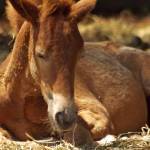Stressors and Foaling Mares: What Do We Know?

Given the foaling process from beginning to end, it is not surprising that mares’ bodies perceive parturition as stressful. Despite years of research into equine reproduction, timing of parturition remains poorly understood.
“Unlike cows and other domesticated species, mares appear to have more control over when they deliver. Under stud farm conditions, for example, over 90% of mares deliver their foals at night when disturbances are minimal,” said Catherine Whitehouse, M.S., a Kentucky Equine Research nutrition advisor.
According to Austrian equine reproduction experts, although the degree of maternal control over the onset of parturition appears to differ between species, stress-like responses occur in many species.* These responses seem to be controlled by two distinct hormone pathways: the hypothalamo-pituitary-adrenocortical and the sympatho-adrenomedullary systems.
“These pathways serve as links between the nervous system and hormone-producing organs, and play important roles in stress and response to external stimuli,” explained Whitehouse. “The hypothalamo-pituitary-adrenocortical system controls the release of the stress hormone cortisol into the bloodstream, which is thought to have profound effects on the timing of parturition.”
Cortisol concentrations in a mare’s bloodstream are already elevated during gestation. At the time of parturition, cortisol levels continue to rise, becoming markedly increased compared to the already high prepartum values. These exceptionally high cortisol levels appear to be restricted to the short expulsive phase of foaling, or when the foal is actually delivered, which often lasts less than 15 minutes.
The researchers wrote, “Cortisol concentration in maternal blood during expulsion of the foal is more than threefold higher than in horses exposed to known stressful challenges such as road transport, acute abdominal disease, traumatic conditions, or abdominal surgery.”
One study found that exposure of actively foaling mares to an experimental stressor during the expulsive phase of foaling (e.g., transfer to a new stable) did not further increase cortisol release. Those data suggest that expulsion of the foal may be perceived as a marked stressor and that further stressors are comparatively inconsequential.
Another recent study conducted by the Austrian researchers looked at foaling mares that were transferred from their familiar, straw-bedded, and dimly lit foaling stall to an unfamiliar, bright stable with only rubber mats on the floor upon fetal membrane rupture. This change, believed to be perceived as a stressful event to foaling mares, increased the time until complete birth of the foal from approximately 5 minutes to 10 minutes compared to mares allowed to foal in their familiar, dimly lit stalls. Specifically, transferring actively foaling mares to a novel environment delayed the onset of foal expulsion (i.e., time until passage of the fetal feet through the vulva); however, progression of the foal through the birth canal proceeded normally.
In conclusion, the researchers underscored that the effects of stress on the initiation and progress of parturition in domestic animals is only partially understood. Due to the potential negative effects on both mare and foal, the researchers felt acute disturbance or manipulation of late-pregnant and foaling mares should be avoided unless veterinary intervention is required.
In addition to decreasing stress during gestation and parturition, maximizing mare health during these periods through routine veterinary and farriery care, including deworming and vaccination, is advised. It is also imperative to provide appropriate nutrition to avoid under- or overconditioning that might negatively influence foaling and future conception rates, particularly if breeding on foal heat.
“Finally, don’t forget about the benefits of marine-derived oil for both mare and foal. Products such as EO-3 with two types of omega-3 fatty acids, EPA and DHA, improve colostrum quality, support foal cognition and retinal development, jump-start anti-inflammatory properties, and positively affect conception rates,” Whitehouse advised.
*Nagel, C., C. Aurich, J. Aurich. 2019. Stress effects on the regulation of parturition in different domestic animal species. Animal Reproduction Science 207:153-161.








